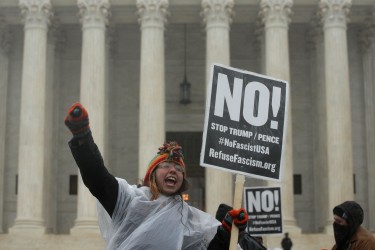Collection
Debating the F-Word
Is Donald Trump a fascist? The question has roiled the historical commentariat ever since the would-be president descended the Trump Tower escalator in 2015 and announced his intention to make America great again. This collection pulls together essays by historians and others about the costs and benefits of drawing parallels between Trumpism and the European political movements of the interwar period.
Fast-forward three years, and historian Samuel Moyn had had enough of the analogy. Analogizing with Naziism and fascism, he argues, “distracts us from home we made Trump over decades, and implies that the coexistence of our democracy with long histories of killing, subjugation, and terror... was somehow less worth the alarm and opprobrium.” Besides, says Moyn, “charging fascism does nothing on its own. Only building an alternative to the present does, which requires imagining it first.”
Sarah Churchwell disagreed with Moyn's dismissal. Here, she makes the case that fascism is a more elastic category and that no two instances of it are exactly alike. “American fascist energies today are different from 1930s European fascism, but that doesn't mean they're not fascist, it means they're not European and it's not the 1930s.”
Historian Victoria de Grazia thinks we should focus less on labels and more on the particular circumstances in which fascism emerged. She says we've “lost sight of the global crises of the early 20th century, born of World War I and the Great Depression, that fascism was invented to address.” Those crises have clear analogs in our own times, she argues, and we have important lessons to learn from the example of those who mobilized to confront them back then.
In this piece, Sarah Churchwell turns back to the racial violence that permeated the U.S. in the interwar years, fomented by nativist groups that in their own time many identified as “fascist.” She recognizes in Trumpism many of the same undercurrents that characterized the Klan-esque terror of those times. “That authoritarian, nativist solutions to political problems did not find traction in the US in the 1930s does not prove that they never could.”
Journalist John Knefel sidesteps the direct question about Trump. “Given the long history of overlap between law enforcement and overtly racist and fascist groups, however, the same question should be asked about police departments across the country.” Here, Knefel chronicles decades of collaborations between police and organizations who deployed violence in the name of white supremacy.
Richard Evans is among the historians who do not buy the analogy. Here, he enumerates the reasons why. “To state these obvious facts is not to encourage complacency. It means that rather than fighting the demons of the past – fascism, Nazism, the militarised politics of Europe’s interwar years – it is necessary to fight the new demons of the present: disinformation, conspiracy theories and the blurring of fact and falsehood.”
Just because analogies are ultimately inaccurate doesn't mean they're useless, countered Priya Satia. To the contrary, they can serve to counter the more flattering invocations of history that many regimes — including the Nazis themselves — have engaged in. “By changing our comparison set, we may more clearly grasp both what makes the present different from what came before and the way the past has habitually been repurposed in a manner inhibiting ethical accountability in the present.”
Well into the Biden years, the debate had not died down. Here, Daniel Bessner considers Americans' use of “fascist” as an endlessly malleable epithet. He is skeptical about its utility, writing that it "allows Americans living today to imagine themselves as part of a consequential world-historical fight between good and evil. It’s an ahistorical framing that gives meaning through romantic nostalgia and provides psychic succor to all of us who have no influence in the corridors of power.”
In a 2023 book inspired by her 2022 podcast, Rachel Maddow wrote about a WWII-era effort by Nazi sympathizers in the U.S. to wage war on the federal government. Here, historian Kathleen Belew praises the book's implicit connections to the present, writing that it looks at the past “to understand where we are — and to locate possibilities for action that we might not otherwise have seen.”
In a book from early 2024, John Ganz made the case that interwar Europe does in fact hold important lessons for Americans today. Here, historian Rick Perlstein zeroes in on one of those lessons: that as in 1930s Europe, there's a long American history of conservatives insisting “that a true sounding of the will of the American people would put paid to the foreign intrusion of liberalism for good.”
The 2024 book reviewed here compiles the best arguments for and against the Trump-as-fascist thesis, and includes essays from many of the authors represented in this Bunk Collection. As reviewer Andrew Marantz notes, the debate has for years been “an overdetermined meta-debate... Where you stand on it is sometimes understood to be a proxy for where you stand on a range of other questions—to begin with, the question of what got us into this mess in the first place.”













